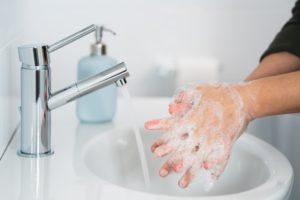 There is no getting around it – handwashing and sanitizing is key to flattening the curve and protecting yourself against Covid-19. While that sounds simple enough, there are two crucial factors in ensuring that it is done effectively: technique and frequency. If you aren’t familiar with the best way to wash your hands and how it impacts your risk of contracting Covid-19, your dentist is here to answer frequently asked questions.
There is no getting around it – handwashing and sanitizing is key to flattening the curve and protecting yourself against Covid-19. While that sounds simple enough, there are two crucial factors in ensuring that it is done effectively: technique and frequency. If you aren’t familiar with the best way to wash your hands and how it impacts your risk of contracting Covid-19, your dentist is here to answer frequently asked questions.
What is the Link Between Covid-19 and Handwashing?
Since the start of the Covid-19 pandemic, there has been new research and findings each week, if not each day. However, the importance of handwashing has remained a top priority from the Centers for Disease Control and Prevention and the World Health Organization. While touching your face with your hands may seem insignificant, each of your hands can hold up to five million bacteria and viruses at any given time. Therefore, millions of germs can enter your body through your eyes, nose, and mouth by simply forgoing handwashing.
How Do I Effectively Wash my Hands?
A quick rinse with soap and water doesn’t do the trick. In order to fight off germs and prevent bacteria or viruses from entering your body, follow these four steps to properly wash your hands:
- Start with clean, running water – The first step in a good handwashing routine is getting your hands wet under clean, running water. The water allows the components in the soap to break down and start killing the germs. If the water is stagnant or dirty, then it is like trying to clean a dirty pan with a dirty sponge.
- Use your soap of choice – While running your hands under water can remove visible dirt and debris, soap is needed to fight bacteria and viruses on a molecular level. Start by applying the soap onto your hands before working it into a lather. For the next 20 seconds, scrub the front and back of your hands, your fingers and fingernails, and underneath any jewelry. This will ensure that even the often-overlooked places are cleaned thoroughly.
- Rinse fully – Once the soap has been used to clean your hands, it is time to rinse with water. This will remove the soapy consistency from your hands along with the germs that were broken down by it.
- Dry completely – Whether you opt for a disposable paper towel, an air dryer, or a soft towel, it is important to completely dry your hands. While each of these methods will do the job, reusable towels can become home to germs, so make sure to wash it regularly to avoid additional exposure.
When Should I Wash My Hands in a Pandemic?
Pandemic or not, washing your hands when preparing food, after using the restroom, or taking out the garbage is a part of everyday life. However, when a pandemic puts everyone at a higher-risk, it is important to wash your hands when:
- You return home from work, the grocery store, the gym, or shopping.
- After shaking someone’s hand.
- When you blow your nose, sneeze, or cough.
- Anytime you touch public railings, countertops, phones, and cash.
It is also important to note that these best practices should be followed within your own home. In cases where you are away and soap and water aren’t available, opting for hand sanitizer can be almost as effective.
In a pandemic that no one is exempt from, taking every measure you can to prevent illness on the front end is of the utmost importance. With these handwashing and sanitizing techniques, you will protect both you and your family whether you are at home or out and about!
About Costello Dental
With five remarkable dentists on staff, the team at Costello Dental can help you with all your dental needs from general dentistry to implants and Invisalign. Their mission is to provide their patients with a positive and caring experience backed by the professionalism they are known for. For more information on the extensive additional measures they are taking to ensure that both their patients and staff are safe, like extensive hand hygiene, don’t hesitate to visit their website or call them at 847-259-1111.
